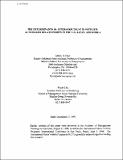The Determinants of Inter-Firm trust in Supplier-Automaker Relationships In the U.S., Japan, and Korea
Author(s)
Dyer, Jeffrey; Chu, Wujin
Download146a.pdf (2.006Mb)
Metadata
Show full item recordAbstract
In this paper we examine the determinants of supplier trust in the buyer in 453supplier-automaker relationships in the U. S., Japan, and Korea. We define trust and derive a model of its determinants drawing upon (1) an embeddedness (relationship-based) perspective, (2) a processbased perspective, and an (3) economic (hostage-based) perspective. Our findings indicate
strong support for the process-based perspective in all countries; embeddedness (e.g., length of
relationship) was only important as a determinant of trust in Japan, and the hostage-based
variable (stock ownership) was not important in any country. More specifically, we found that
high supplier trust emerges when (1) automakers have developed supplier-selection routines that
favor incumbents and which maintain a continuing (repeated) exchange relationship with the
supplier, and (2) automakers have developed assistance-giving routines to help suppliers solve
problems and improve. Although there were some differences across institutional environments,
notably higher trust in Japan, the findings are quite robust across the institutional environments.
Indeed, in a sample of U.S. suppliers selling to both U.S. and Japanese automakers in the United
States, we found that Japanese automakers were more effective than U.S. automakers at building
trusting relations with U.S. suppliers. The ability of Japanese automakers to build high levels of
trust with suppliers in the United States suggests that the institutional environment may be less
important than firm-level practices in the production of inter-organizational trust.
Date issued
1997-12-17Series/Report no.
IMVP;146a
Keywords
inter-firm, Korea, supplier trust, supplier - automaker